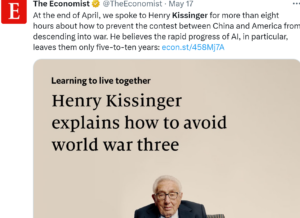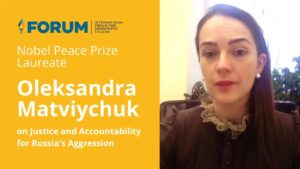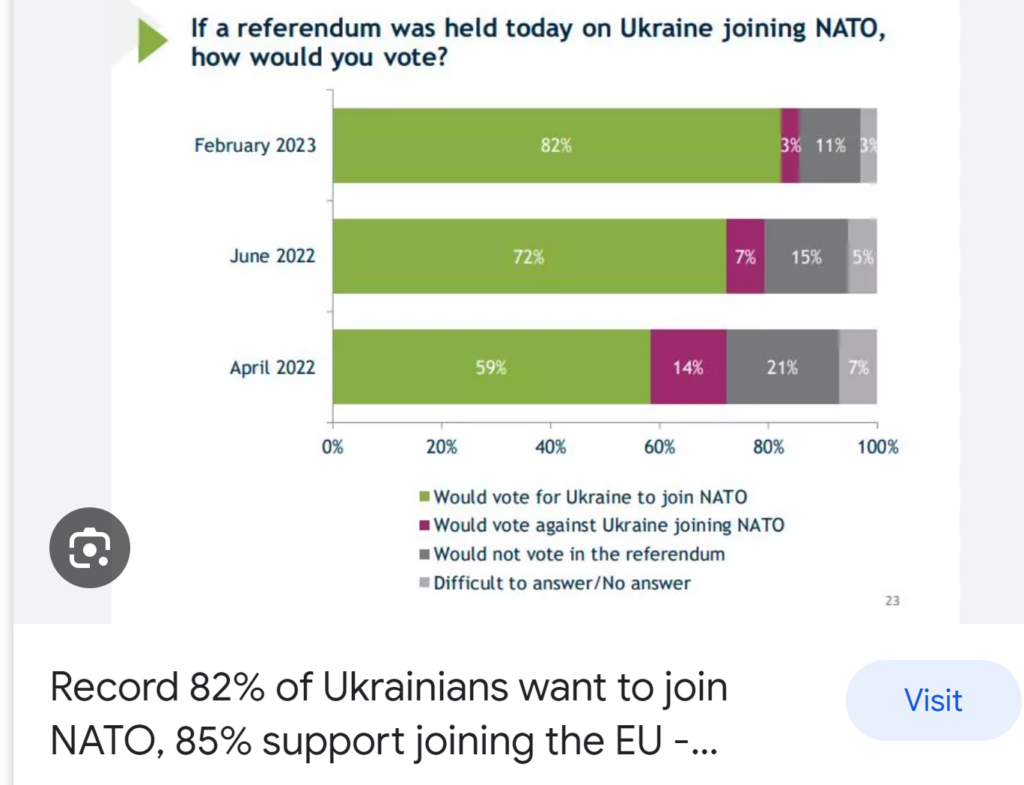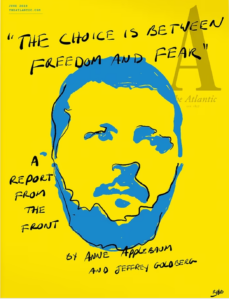Leaders of the world’s richest democracies agreed on Friday to stiffen sanctions against Russia, while a draft communique to be issued after their talks in the Japanese city of Hiroshima stressed the need to reduce reliance on trade with China, Reuters reports (above).
“Ukraine is now a major state,” President Volodomir Zelensky “has proven an extraordinary leader” and the invasion was “certainly a catastrophic mistake of judgement by Putin,” but the decision to leave open Ukraine’s NATO membership was also “very wrong,” says former secretary of state and national security adviser Henry Kissinger.
 Balance of dissatisfaction
Balance of dissatisfaction
But Kissinger now supports full NATO membership for Ukraine for two reasons, he tells The Economist:
- One, Russia is no longer the conventional threat that it used to be. So the challenges of Russia should be considered in a different context.
- And secondly, we have now armed Ukraine to a point where it will be the best-armed country and with the least strategically experienced leadership in Europe.
“If the war ends like it probably will, with Russia losing many of its gains, but retaining Sevastopol, we may have a dissatisfied Russia, but also a dissatisfied Ukraine—in other words, a balance of dissatisfaction,” Kissinger suggests.
 The powerlessness of Russian protests to stop the invasion of Ukraine was to be expected. What was unexpected was that Russian civil society didn’t collapse in the face of this assault, says Dan Storyev, managing editor at OVD-Info, a human rights monitoring group.
The powerlessness of Russian protests to stop the invasion of Ukraine was to be expected. What was unexpected was that Russian civil society didn’t collapse in the face of this assault, says Dan Storyev, managing editor at OVD-Info, a human rights monitoring group.
Thousands of Russians went on to the streets anyway. Exiles continued anti-war activism abroad. Every major independent Russian media organisation opposed the war. Human rights groups like ours continued resisting the Kremlin’s authoritarianism, but the authorities respond by throwing dissidents into jail for decades and hounding opposition activists like Vladimir Kara-Murza, he writes for The Financial Times.
Russians do protest, but they are stifled by a powerful and cruel regime. If governments and people abroad want more protests, they should support #Russia‘s #civilsociety, @OvdInfo @ovdinfo_en‘s @storyevtime writes for @FT. https://t.co/k3mDSWZzVw
— Democracy Digest (@demdigest) May 19, 2023
Civil society activists say the legal battle in Ukraine will have broad implications for how Russia can be held to account in other war zones, Foreign Policy’s Robbie Gramer writes.
Japan and other members of the international community should send legal experts to Ukraine to help deliver justice to victims of Russian war crimes, Ukrainian human rights activist Oleksandra Matviichuk told Nikkei.
 “We are faced with unprecedented numbers of war crimes, and our national system is overloaded,” she said. Human rights lawyer Matviichuk heads the nonprofit Center for Civil Liberties, which was awarded the Nobel Peace Prize in 2022 [after receiving the National Endowment for Democracy’s Award the same year].
“We are faced with unprecedented numbers of war crimes, and our national system is overloaded,” she said. Human rights lawyer Matviichuk heads the nonprofit Center for Civil Liberties, which was awarded the Nobel Peace Prize in 2022 [after receiving the National Endowment for Democracy’s Award the same year].
Ukrainians are more committed than ever to a European future, according to recent polling data published by the International Republican Institute, which found that 85% of Ukrainians want their country to join the EU and 82% wish to join NATO, note IRI’s Stephen Nix and Zachary Popovich.
Ukraine’s trajectory as a free and modern European state would shore up the transatlantic community’s defense against Russian encroachment, and would also help to limit the scope for interference by Moscow’s autocratic ally in Beijing, they write for the Atlantic Council. An independent, European Ukraine not only denies Russia its delusional revanchist empire; it offers a path for Kyiv to secure freedom and prosperity centered around democratic values.

Don’t be scared, be prepared, says Oxford University’s Timothy Garton-Ash. There is no risk-free way forward. Avoiding an immediate risk can mean creating larger risks down the road (which is the mistake the West made after 2014 when it allowed Russia to keep Crimea and negotiated the sticking plaster Minsk Agreement for occupied eastern Ukraine).
 These risks include not only recurrent armed conflict in Ukraine but also encouraging China to have a go at Taiwan, he writes. I’ve lost count of the number of times Ukrainians have said to me that the West’s biggest problem is fear. “The choice is between freedom and fear,” as President Volodymyr Zelensky recently told the Atlantic.
These risks include not only recurrent armed conflict in Ukraine but also encouraging China to have a go at Taiwan, he writes. I’ve lost count of the number of times Ukrainians have said to me that the West’s biggest problem is fear. “The choice is between freedom and fear,” as President Volodymyr Zelensky recently told the Atlantic.
Freedom House hosts a virtual discussion on its “Nations in Transit 2023” report about the state of democracy in the 29-country region stretching from Central Europe to Central Asia. Speakers: Kurt Bassuener, co-founder & senior associate, Democratization Policy Council; Olga Onuch, senior lecturer in politics, University of Manchester; Zsuzsanna Szelenyi, program director, Central European University Democracy Institute Leadership Academy; Paul Taylor, senior fellow at Friends of Europe; Nicole Bibbins Sedaca, executive VP for strategy and programs at Freedom House; and Mike Smeltzer, senior research analyst for Europe and Eurasia at Freedom House. 9 am. May 24, 2023. RSVP
The Centre for Financial Crime and Security Studies (CFCS) at RUSI and the Ukraine-based think tank Better Regulation Delivery Office (BRDO) invite you to a half-day conference on Securing the Integrity and Resilience of Ukraine’s Financial System.
As discussions on the funding of Ukraine’s reconstruction continue, this event, to be held on the margins of the Ukraine Recovery Conference (URC) that will be co-hosted in London by the UK government in June, will address an issue that is currently absent from the wider URC agenda and discussions related to reconstruction – namely, the importance of integrity and resilience in the Ukrainian financial system to combat potential corruption-related money laundering.
This is the latest activity of RUSI’s Project SMURF, funded by the National Endowment for Democracy (NED), through which the CFCS engages with government, private sector and civil society partners in Ukraine on the importance of integrity and resilience in the Ukrainian financial system. – (BST) RSVP







